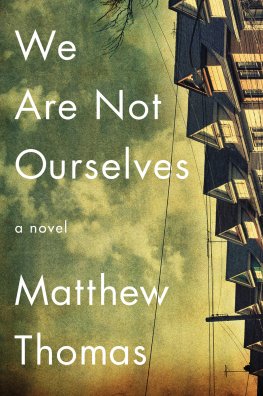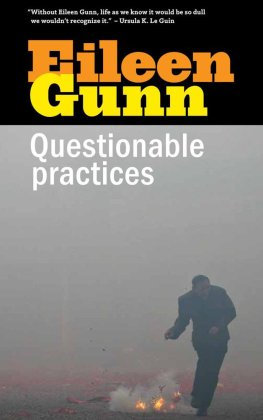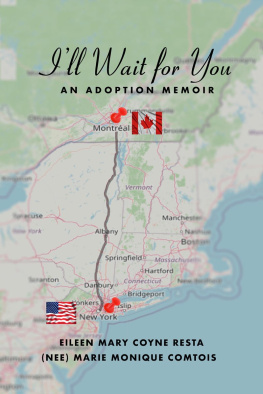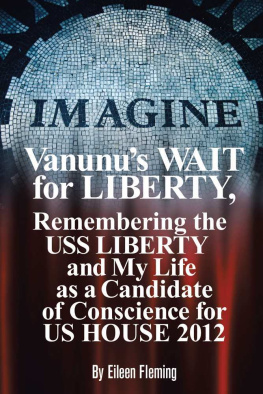Matthew Thomas
We Are Not Ourselves
Darling, do you remember
the man you married? Touch me,
remind me who I am.
Stanley Kunitz
We are not ourselves
When nature, being oppressed, commands the mind
To suffer with the body.
King Lear
His father was watching the line in the water. The boy caught a frog and stuck a hook in its stomach to see what it would look like going through. Slick guts clung to the hook, and a queasy guilt grabbed him. He tried to sound innocent when he asked if you could fish with frogs. His father glanced over, flared his nostrils, and shook the teeming coffee can at him. Worms spilled out and wriggled away. He told him hed done an evil thing and that his youth was no excuse for his cruelty. He made him remove the hook and hold the twitching creature until it died. Then he passed him the bait knife and had him dig a little grave. He spoke with a terrifying lack of familiarity, as if they were simply two people on earth now and an invisible tether between them had been severed.
When he was done burying the frog, the boy took his time patting down the dirt, to avoid looking up. His father told him to think awhile about what hed done and walked off. The boy crouched listening to the receding footsteps as tears came on and the loamy smell of rotting leaves invaded his nose. He stood and looked at the river. Dusk stole quickly through the valley. After a while, he understood hed been there longer than his father had intended, but he couldnt bring himself to head to the car, because he feared that when he got there hed see that his father no longer recognized him as his own. He couldnt imagine anything worse than that, so he tossed rocks into the river and waited for his father to come get him. When one of his throws gave none of the splashing sound hed gotten used to hearing, and a loud croak rose up suddenly behind him, he ran, spooked, to find his father leaning against the hood with a foot up on the fender, looking as if he wouldve waited all night for him, now adjusting his cap and opening the door to drive them home. He wasnt lost to him yet.
Part I. Days under Sun and Rain, 19511982
Instead of going to the priest, the men who gathered at Dohertys Bar after work went to Eileen Tumultys father. Eileen was there to see it for herself, even though she was only in the fourth grade. When her father finished his delivery route, around four thirty, he picked her up at step dancing and walked her over to the bar. Practice went until six, but Eileen never minded leaving the rectory basement early. Mr. Hurley was always yelling at her to get the timing right or to keep her arms flush at her sides. Eileen was too lanky for the compact movements of a dance that evolved, according to Mr. Hurley, to disguise itself as standing still when the police passed by. She wanted to learn the jitterbug or Lindy Hop, anything she could throw her restless limbs into with abandon, but her mother signed her up for Irish dancing instead.
Her mother hadnt let go of Ireland entirely. She wasnt a citizen yet. Her father liked to tout that hed applied for his citizenship on the first day he was eligible to. The framed Certificate of Citizenship, dated May 3, 1938, hung in the living room across from a watercolor painting of St. Patrick banishing the snakes, the only artwork in the apartment unless you counted the carved-wood Celtic cross in the kitchen. The little photo in the certificate bore an embossed seal, a tidy signature, and a face with an implacably fierce expression. Eileen looked into it for answers, but the tight-lipped younger version of her father never gave anything up.
When Eileens father filled the doorway with his body, holding his Stetson hat in front of him like a shield against small talk, Mr. Hurley stopped barking, and not just at Eileen. Men were always quieting down around her father. The recording played on and the girls finished the slip jig they were running. The fiddle music was lovely when Eileen didnt have to worry about keeping her unruly body in line. At the end of the tune, Mr. Hurley didnt waste time giving Eileen permission to leave. He just looked at the floor while she gathered her things. She was in such a hurry to get out of there and begin the wordless walk that she waited until she got to the street to change her shoes.
When they reached the block the bar was on, Eileen ran ahead to see if she could catch one of the men sitting on her fathers stool, which shed never seen anyone else occupy, but all she found was them gathered in a half circle around it, as if anticipation of his presence had drawn them near.
The place was smoky and she was the only kid there, but she got to watch her father hold court. Before five, the patrons were laborers like him who drank their beers deliberately, contented in their exhaustion, well-being hanging about them like a mist. After five, the office workers drifted in, clicking their coins on the crowded bar as they waited to be served. They gulped their beers and signaled for another immediately, gripping the railing with two hands and leaning in to hurry the drink along. They watched her father as much as they did the bartender.
She sat at one of the creaky tables up front, in her pleated skirt and collared blouse, doing her homework but also training an ear on her fathers conversations. She didnt have to strain to hear what they told him, because they felt no need to whisper, even when she was only a few feet away. There was something clarifying in her fathers authority; it absolved other men of embarrassment.
Its driving me nuts, his friend Tom said, fumbling to speak. I cant sleep.
Out with it.
I stepped out on Sheila.
Her father leaned in closer, his eyes pinning Tom to the barstool.
How many times?
Just the once.
Dont lie to me.
The second time I was too nervous to bring it off.
Thats twice, then.
It is.
The bartender swept past to check the level of their drinks, slapped the bar towel over his shoulder, and moved along. Her father glanced at her and she pushed her pencil harder into her workbook, breaking off the point.
Whos the floozy?
A girl at the bank.
Youll tell her the idiocy is over.
I will, Mike.
Are you going to be a goddamned idiot again? Tell me now.
No.
A man came through the door, and her father and Tom nodded at him. A draft followed him in, chilling her bare legs and carrying the smell of spilled beer and floor cleaner to her.
Reach into your pocket, her father said. Every penny you have stashed. Buy Sheila something nice.
Yes, thats the thing. Thats the thing.
Every last penny.
I wont hold out.
Swear before God that thats the end of it.
I swear, Mike. I solemnly swear.
Dont let me hear about you gallivanting around.
Those days are over.
And dont go and do some fool thing like tell that poor woman what youve done. Its enough for her to put up with you without knowing this.
Yes, Tom said. Yes.
Youre a damned fool.
I am.
Thats the last well speak of it. Get us a couple of drinks.
They laughed at everything he said, unless he was being serious, and then they put on grave faces. They held forth on the topic of his virtues as though he werent standing right there. Half of them hed gotten jobs for off the boat at Schaefer, at Macys, behind the bar, as supers or handymen.
Everybody called him Big Mike. He was reputed to be immune to pain. He had shoulders so broad that even in shirtsleeves he looked like he was wearing a suit jacket. His fists were the size of babies heads, and in the trunk he resembled one of the kegs of beer he carried in the crook of each elbow. He put no effort into his physique apart from his labor, and he wasnt muscle-bound, just country strong. If you caught him in a moment of repose, he seemed to shrink to normal proportions. If you had something to hide, he grew before your eyes.












